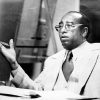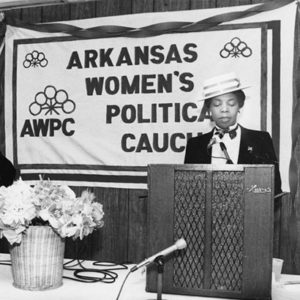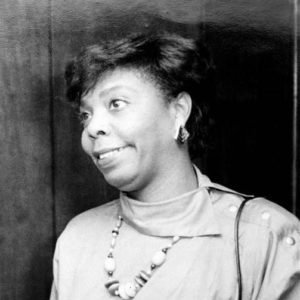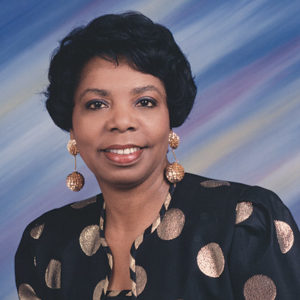calsfoundation@cals.org
Lottie Lee Holt Shackelford (1941–)
Lottie Lee Holt Shackelford is a prominent African-American political leader who became the first female mayor of Little Rock (Pulaski County) and commanded leadership roles in the national Democratic Party for three decades. She was an Arkansas delegate to every Democratic National Convention from 1980 through 2012, often as a so-called superdelegate, and was chosen to be an automatic superdelegate for the 2016 convention. In addition, she was the longest-serving national vice chair in the Democratic Party’s history. She is a member of the Arkansas Black Hall of Fame.
Lottie Lee Holt was born on April 30, 1941, in Little Rock, one of four children—with two sisters and a brother—of Curtis Holt Sr. and Bernice Linzy Holt. Her father was a porter and chef for the Union Pacific Railroad and a truck driver. Her mother worked in a school cafeteria and at an Ottenheimer manufacturing plant, which was one of the first Arkansas industries to employ African Americans in anything but custodial jobs; she later worked as a laboratory assistant in the state milk-inspection program. Lottie Holt graduated in 1958 from Horace Mann High School, Little Rock’s all-black high school at the time.
Intending to become a microbiologist, she enrolled that fall at Philander Smith College, the school having developed a reputation in the sciences. When her father became ill and died in 1963, however, she left school. She had married Calvin Henry Shackelford Jr. of Little Rock, who was an airman, in 1958 and traveled with him to several assignments at U.S. Air Force bases. They eventually had a son and two daughters. They divorced in 1984.
She returned to Philander Smith when her oldest child was a senior in high school and received a bachelor’s degree in business administration in 1979. She worked for the Urban League of Greater Little Rock; the Economic Opportunity Agency of Pulaski County (part of President Lyndon Johnson’s War on Poverty); the Opportunities Industrialization Center, which was formed to promote job opportunities for African Americans; and the University of Arkansas for Medical Sciences as a computer laboratory specialist.
In 1974, she ran for a position on the Board of Directors for Little Rock in a citywide election; she finished third in a field of five. The seat was won by a white businessman. Four years later, the board appointed her to a vacant position for two years, and she ran for the seat in 1980 and won. It was the first time that a black candidate won a majority in a citywide race. She was reelected twice, and the board in 1987 elected her mayor, the city’s first female mayor. (Charles Bussey in 1981 had been the city’s first black mayor.) As mayor, she held leadership positions in the National League of Cities. She was mayor until 1991.
Shackelford became increasingly active in the Democratic Party in the 1980s, starting with her work in the campaigns of Bill Clinton and her selection as delegate to the 1980 Democratic National Convention. She served as secretary, vice chair, and chair of the Democratic State Committee. She became a member of the Democratic National Committee in the early 1980s and served as a co-chair of the Platform Committee of the Democratic National Convention in 1984 and co-chair of the 1988 convention as well as of its Rules Committee.
As a vice chair of the Democratic National Committee starting in 1989 and continuing into the second decade of the twenty-first century, her roles evolved. As vice chair for voter registration and participation in the early 1990s, Shackelford participated in political forums in several European and Asian countries and went to Balkan and Baltic countries to observe elections in emerging states after the breakup of the Soviet empire. In 1989, she embarked on a six-week lecture tour on women in politics in southern and western Africa.
She was deputy manager of Governor Bill Clinton’s campaign for president in 1992 and a member of the president-elect’s transition team. The new president appointed her the U.S. delegate to the United Nations Commission on the Status of Women in Vienna, Austria, and to the board of directors of the Overseas Private Investment Corporation (OPIC), an independent federal agency that encourages U.S. businesses to invest in developing countries and gain footholds in emerging global markets with insurance and financing guarantees. She was the first African-American woman on the OPIC board. In 1994, she became executive vice president of Global USA, Inc., an international business facilitator that promotes business opportunities in high-technology industrial sectors.
In 1993, she was inducted into the Arkansas Black Hall of Fame. She was a founder in 1998 of the Women’s Foundation of Arkansas, which is dedicated to the advancement of women in the state. In 2014, she led the Women’s Caucus of the Democratic National Committee.
For additional information:
Rains, Judy. “Lottie Shackelford.” Arkansas Gazette, September 6, 1987, High Profile, pp. 1, 7.
Takiff, Michael. A Complicated Man: The Life of Bill Clinton as Told by Those Who Know Him. New Haven: Yale University Press, 2010.
Thomas, Angela E. “First Lady.” AY magazine, February 2011, pp. 74–77.
Ernest Dumas
Little Rock, Arkansas
 Arkansas Women's Hall of Fame
Arkansas Women's Hall of Fame Bussey, Charles E., Jr.
Bussey, Charles E., Jr. Divergent Prosperity and the Arc of Reform, 1968–2022
Divergent Prosperity and the Arc of Reform, 1968–2022 Arkansas Women's Political Caucus
Arkansas Women's Political Caucus  Lottie Shackelford
Lottie Shackelford  Lottie Shackelford
Lottie Shackelford 




Comments
No comments on this entry yet.